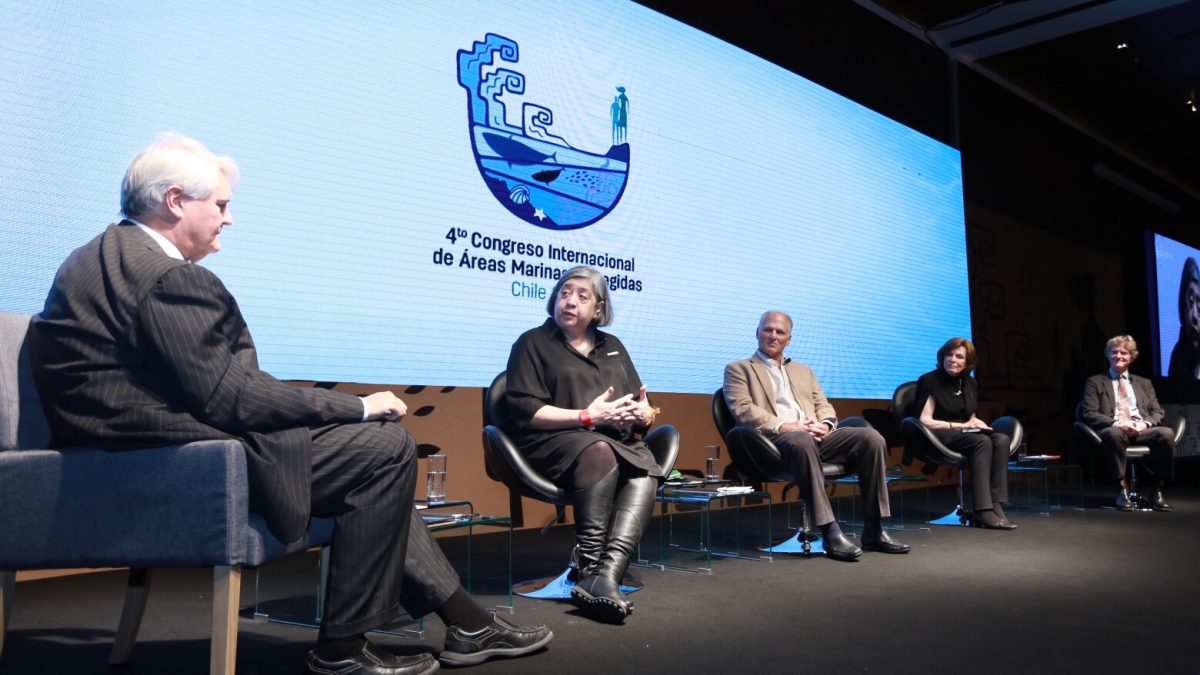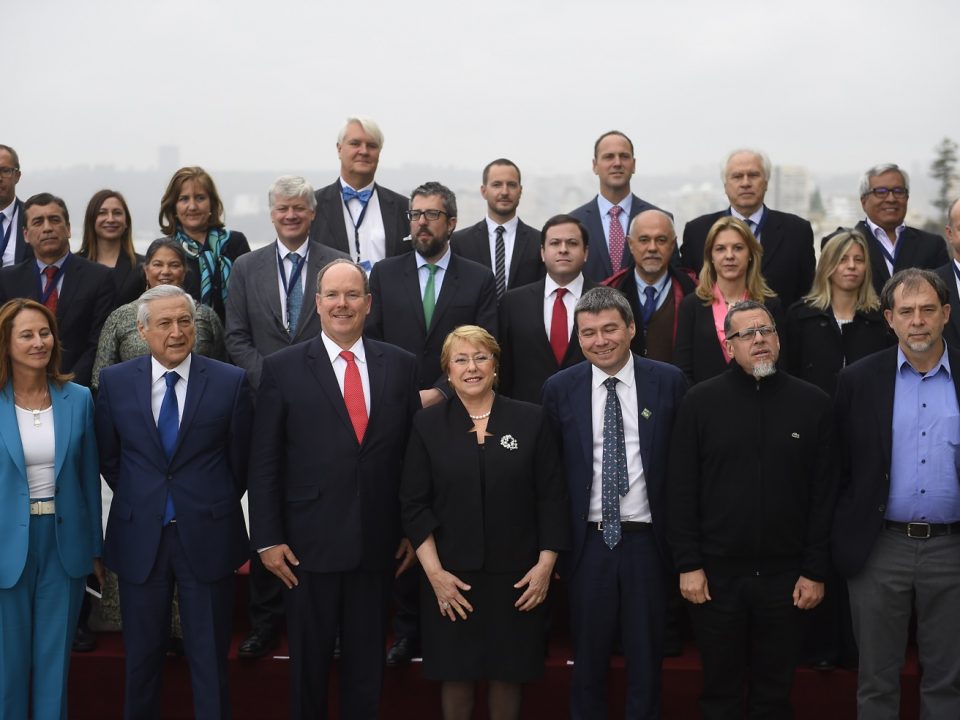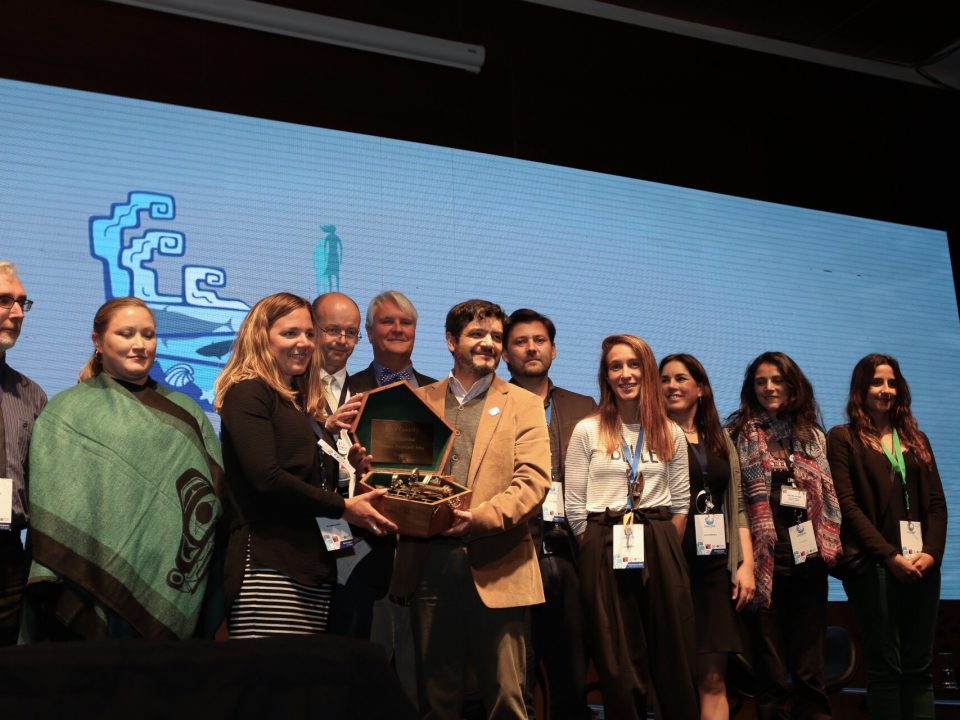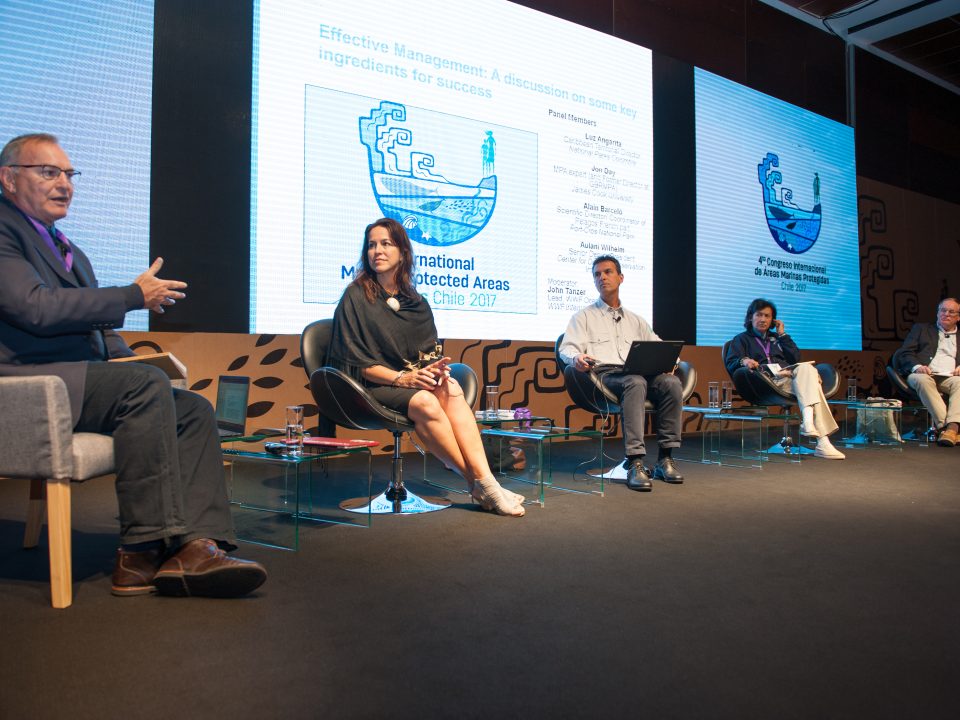An in-depth look at the interrelationship between the oceans and climate change, motivated the debate today between the experts who participated in the plenary session of the second conference day at the International Marine Protected Areas Congress, IMPAC 4, in the city of La Serena, Chile.
The panel was moderated by Carl Gustaf Lundin, Director of the IUCN Global Marine and Polar Programme, who initiated the conversation highlighting the key importance of introducing a more adaptive management strategy, in times where the oceans are subject to constant threats like climate change and over exploitation of its species. “Today we will talk about science and we will understand what’s missing in terms of knowledge to improve the situation. It’s an opportunity to get to know who the people working in these subjects in different countries”, he pointed.
Patricia Majluf, vice president of Oceana Peru stated that the changes in marine ecosystems are significant and affect many people. As an example she mentioned fishermen, who have had to adapt themselves to these changes and will take time to modify their perspective on what marine wealth is. “They will have to learn that this source of resources is also an area that must be protected.” She also added that “marine protected areas (MPAs) have grown enormously in Chile, unlike the case of Peru that only has small reserves along its coastline. However, she highlighted that Peru does function as a system that provides more resilience, by allowing the transit of animals from north to south given the environmental variability caused by El Niño current and the learnings it has provide in the last four years. “Our countries are interesting laboratories”.
For its part, Alan Friedlander of the University of Hawaiʻi in the United States, pointed that the ecosystems are changing rapidly, and that it is not possible to predict what will happen. “The MPAs represent our best choice for ecosystems to manage themselves without human intervention. Chile sets a really good example on this, because it has worked with small scale areas and large ones, and with the communities and the authorities to move forward, so it is very logical that this IMPAC4 is held in this country”, he emphasized. The expert also stated that only a small portion of the oceans have been protected, “but without the appropriate management, the protected area becomes irrelevant, and thus a strong action is needed in this respect.”
The scientist and global change specialist from the University of Edinburgh, Alexander Tudhope, pointed that climate change is real and it is happening. What we are observing in terms of temperature rise and ocean acidification is all part of what was predicted years ago. “Climate variability on earth has a lot to do with ocean and atmospheric interactions in the Pacific Caribbean, but has global consequences. We have had three monstrous El Niño phenomenon in these last 40 years, presenting exceptional and unusual patterns compared to those of the last centuries. We are looking at systems that are being challenged like they have not been challenged for many years, which has an impact on ecosystems.”
Tudhope underlined that climate change is not something that can be resolved solely through marine protected areas, but that doesn’t mean we can’t be proactive to mitigate and reduce as much as possible the impact on MPAs. “New areas must be identified that can be key refuges where species go to when they are stressed and need to protect themselves, but from where they could expand to other areas as well”, he clarified.
The plenary session concluded with the words of Sylvia Earle, renowned oceanographer representing Mission Blue, a global network devoted to raise awareness and support for the MPAs. She declared to feel inspired by this gathering of people from all over the world who are working to protect the ocean.
If we could take all the information we know today and take it back to the mid XX century, when we didn’t know that oceans mattered so much. Imagine half a century from now, what we wish we had done today. “The information we know today about the importance of ecosystem protection is not something we had half a century ago. This gives us the opportunity to apply that knowledge to change our destiny. The most important thing we extract from the oceans is our existence. But we don’t realize that. We only measure oceans’ value by the fish we take out from it, dead fish. And that’s OK, it is important for many people, but we have to respect the source and not use everything as if it only had a dollar sign on it. We need nature, but we have to respect her”.
Sylvia Earle stressed the need to work with people from all over the world to maintain the planet’s integration. “We need to think big, much bigger than what we have thought before. We have a long way to go to achieve 30% marine protected areas by 2030”.
Signing Agreement Chile – United States
Besides the multiple talks and discussion panels held throughout this second conference day at IMPAC4, this Tuesday September 5th also saw the inauguration of Chile’s Pavilion at the Enjoy Hotel in Coquimbo, in a ceremony led by the Environment Minister, Marcelo Mena. Marcelo Mena also took part in the signing agreement between Chile and the United States, which extended the US-Chile Cooperation MOU on Marine and terrestrial Protected Areas by 5 years until 2023. Together with the Environment Minister, other authorities participated of the ceremony. On the Chilean side were representatives of CONAF (National Forest Corporation), Subpesca (Fishing Undersecretary), and Sernapesca (Fishing National Service). On behalf of the United States were representatives of NOAA’s (National Oceanic and Atmospheric Administration) Office of National Marine Sanctuaries and the National Park Service.
IMPAC4 continues tomorrow Wednesday September 6th from 8.30am with a new plenary discussion on “Marine Protected Areas and Coastal Communities”. The panel will be moderated by John Armor, Director of NOAA’s Office of National Marine Sanctuaries from the United States. Other members of the panel will include Poki Tane Haoa (Rapa Nui, Chile); Kalani Quiocho (NOAA Hawai’i, United States); Felipe Paredes (Juan Fernandez Archipelago, Chile) and Gustavo Cabrera (CCO-OMOA, Honduras).
For more information visit the web site: www.impac4.org
Follow us on social media:
Twitter: @impac4_Chile / #IMPAC4
FB: IMPAC 4 Chile
Instagram: impac4chile2017
Press contacts for IMPAC 4:
Eliana Chong
comunicacionesimpac4@neuronagroup.cl
++569 8502 2462
Héctor Mondaca
prensaimpac4@neuronagroup.cl
++569 8479 7407




